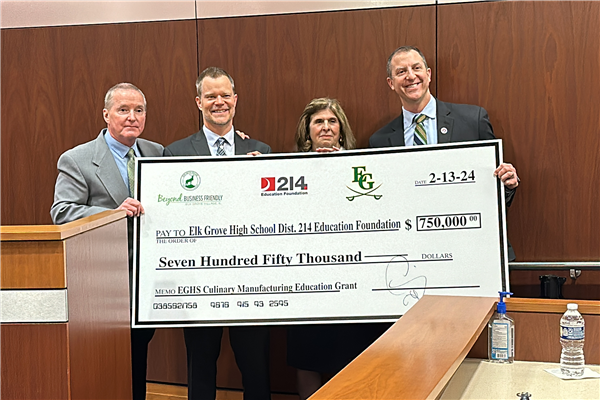Village donation puts EGHS culinary lab expansion on the menu

Published February 22, 2024
Elk Grove Village has served up a generous boost to Elk Grove High School’s (EGHS) Culinary Arts program with a $750,000 grant - formalized during a recent check presentation ceremony.
The grant will help fund a major expansion of the school’s Culinary Manufacturing Lab, creating cross-curricular opportunities for students pursuing careers in such areas as food production, restaurant and catering management.
Work will begin this summer on a state-of-the-art industrial kitchen, with half a dozen gas ranges, commercial-grade ovens, mixers, dishwashers, griddles and related equipment. An adjacent classroom will be used for instruction, serving, catering and hosting events.
In presenting the check to District 214 Board President Alva J Kreutzer, Superintendent Dr. Scott Rowe and EGHS Principal Paul Kelly, Elk Grove Village Mayor Craig Johnson stressed the value of the partnership between the village and school district.
“By providing this grant, we’re investing in our youth while also providing local companies with a deeper talent pool to draw from,” the mayor said. “We’re also recognizing the vision, innovation, creativity and enthusiasm of EGHS faculty who have worked so hard to elevate this program.”
Kelly noted that the expansion will allow the school to provide instruction for 40 additional students, beyond the 150 currently in the Culinary Arts program. “We know that students learn best when they are able to apply their knowledge in real-world settings across multiple disciplines,” he said.
The Culinary Arts Career Pathway offers students the opportunity to explore careers in food preparation, service and management through a combination of classroom courses and work-based experience in professional kitchens throughout the community. In at least one instance, culinary students worked with a local restaurant to develop creations for a seasonal menu.
In Foods 1 and 2, students earn the basic safety certification, solidify knife skills and study measurement, conversion and basic recipe prep—all of which apply to actual jobs. Students then advance to ProStart 1 and 2, where they earn a food handlers certification from ServSafe which is recognized by most restaurants and the National Restaurant Association Educational Foundation.
In the ProStart class sequence, students also delve more deeply into the outside-the-kitchen skills – such as collaboration, menu development and marketing - needed to advance in professional culinary settings.

